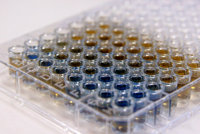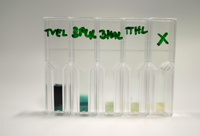© Universität Bielefeld
uni.news
Published on
7. November 2012
Category
General
Synthetic biofilter wins through to the top ‘Sweet Sixteen’ in Boston
Bielefeld students on a par with teams from international elite universities
Months of painstaking work in the laboratory at Bielefeld University‘s Center for Biotechnology (CeBiTec) have paid off: the 15 students participating in this year’s ‘international Genetically Engineered Machine competition’ (iGEM) at the Massachusetts Institute of Technology (MIT) have good reason to celebrate. The goal of their project was to develop a biological filter that removes estrogen from drinking water. It was a success: they managed to produce enzymes that break down the hormone. On Monday 5 November, the competition finals came to a close in Boston. From 190 teams throughout the world, Bielefeld’s students made it through to the ‘Sweet Sixteen’, the selection of the 16 best teams in the company of teams from such prestigious universities as Stanford University (USA), the Canadian University of Calgary, and Jiaotong University in Shanghai, China.
 More than 70 teams from throughout the world got through to the finals of the top student competition in synthetic biology. The Bielefeld team was one of five German teams at the start. Bielefeld University has now participated in the iGEM competition for the third year running and already succeeded in qualifying for Boston in 2010 and 2011. This year’s team, like its predecessors, made it into the ‘Sweet Sixteen’. ‘We stand in direct comparison with universities like Stanford and Cornell. At first, that seemed very intimidating, but we soon noticed they were having to fight exactly the same problems as we were. And with our know-how, we can match the pace here’, says Moritz Müller, a master student of molecular biotechnology.
More than 70 teams from throughout the world got through to the finals of the top student competition in synthetic biology. The Bielefeld team was one of five German teams at the start. Bielefeld University has now participated in the iGEM competition for the third year running and already succeeded in qualifying for Boston in 2010 and 2011. This year’s team, like its predecessors, made it into the ‘Sweet Sixteen’. ‘We stand in direct comparison with universities like Stanford and Cornell. At first, that seemed very intimidating, but we soon noticed they were having to fight exactly the same problems as we were. And with our know-how, we can match the pace here’, says Moritz Müller, a master student of molecular biotechnology.
 Enzymes from fungi growing on trees filter out medicine residues from sewage and drinking water
Enzymes from fungi growing on trees filter out medicine residues from sewage and drinking water
Conventional methods of filtering waste water in sewage treatment plants are unable to completely remove medicine residues such as the estrogens in birth control pills. These residues then find their way into rivers and lakes and also accumulate in our drinking water. For fish and other aquatic life, estrogens can lead to reproductive and developmental disorders and even to the formation of female characteristics in males. The potential long-term consequences for human beings – declining sperm counts, infertility, various cancers, and osteoporosis – are still largely unknown.
 The Bielefeld iGEM team has developed a biological filter in which specific enzymes (so-called laccases) break down these medicine residues. One known source of particularly efficient laccases is the turkey tail, a type of fungus that grows on trees. Using methods from synthetic biology, the students succeeded in synthesizing this enzyme and applying it to filter material. ‘We didn’t want to invent something totally crazy with our project – just because it’s technically feasible. We wanted to do something that could actually be put to use in the near future, perhaps in 20 years, and be a real benefit’, explains Robert Braun, a master student of molecular biotechnology. ‘The biofilter is such a project. And we have shown that our idea works. In principle, a company could now come along and develop our filter further. We ourselves have got to get back to our studies – most of us have rather neglected them for the last 6 months. However, the experiences we have gathered more than compensate for that’.
The Bielefeld iGEM team has developed a biological filter in which specific enzymes (so-called laccases) break down these medicine residues. One known source of particularly efficient laccases is the turkey tail, a type of fungus that grows on trees. Using methods from synthetic biology, the students succeeded in synthesizing this enzyme and applying it to filter material. ‘We didn’t want to invent something totally crazy with our project – just because it’s technically feasible. We wanted to do something that could actually be put to use in the near future, perhaps in 20 years, and be a real benefit’, explains Robert Braun, a master student of molecular biotechnology. ‘The biofilter is such a project. And we have shown that our idea works. In principle, a company could now come along and develop our filter further. We ourselves have got to get back to our studies – most of us have rather neglected them for the last 6 months. However, the experiences we have gathered more than compensate for that’.
International competition
The iGEM competition has been held every year since 2003 by the Massachusetts Institute of Technology (MIT) in Boston. Starting as an MIT study course, the number of competitors has grown rapidly from five teams in 2004 to 190 in the present year. All teams face the same task: taking their project from the idea across the laboratory work to gaining funding and communicating the findings. On the student level, the iGEM can be seen as the world championship in synthetic biology that shows the future potential of this still young field of research. The Bielefeld iGEM team is being funded by Bielefeld University‘s Center for Biotechnology (CeBiTec) and the BIO.NRW Cluster Biotechnology North Rhine-Westphalia.
For further information in the Internet, go to:
www.igem-bielefeld.de
http://2012.igem.org/Team:Bielefeld-Germany
Months of painstaking work in the laboratory at Bielefeld University‘s Center for Biotechnology (CeBiTec) have paid off: the 15 students participating in this year’s ‘international Genetically Engineered Machine competition’ (iGEM) at the Massachusetts Institute of Technology (MIT) have good reason to celebrate. The goal of their project was to develop a biological filter that removes estrogen from drinking water. It was a success: they managed to produce enzymes that break down the hormone. On Monday 5 November, the competition finals came to a close in Boston. From 190 teams throughout the world, Bielefeld’s students made it through to the ‘Sweet Sixteen’, the selection of the 16 best teams in the company of teams from such prestigious universities as Stanford University (USA), the Canadian University of Calgary, and Jiaotong University in Shanghai, China.
Hundreds of samples were needed to reach success: The synthetic biofilter developed by Bielefeld University’s iGEM team can filter out estrogens from contaminated water.
Students at Bielefeld University have developed synthetic enzymes and applied them to tiny glass beads. They now filter the test solution like a gravel bed – the darker they become, the better the synthetic biofilter.
Conventional methods of filtering waste water in sewage treatment plants are unable to completely remove medicine residues such as the estrogens in birth control pills. These residues then find their way into rivers and lakes and also accumulate in our drinking water. For fish and other aquatic life, estrogens can lead to reproductive and developmental disorders and even to the formation of female characteristics in males. The potential long-term consequences for human beings – declining sperm counts, infertility, various cancers, and osteoporosis – are still largely unknown.
Bielefeld students at the Massachusetts Institute of Technology in Boston. Back row from left to right: Saskia Scheibler, Kevin Jarosch, Miriam Fougeras, Julia Voss, Isabel Huber, Malak Fawaz, Moritz Müller, Gabriele Kleiner, and Nils-Christian Lübke (supervisor). Front row from left to right: Timo Wolf (supervisor), Julia Schirmacher, Hakan Geyik, Nadine Legros, Robert Braun, Agatha Walla, and Sebastian Wiebe.
International competition
The iGEM competition has been held every year since 2003 by the Massachusetts Institute of Technology (MIT) in Boston. Starting as an MIT study course, the number of competitors has grown rapidly from five teams in 2004 to 190 in the present year. All teams face the same task: taking their project from the idea across the laboratory work to gaining funding and communicating the findings. On the student level, the iGEM can be seen as the world championship in synthetic biology that shows the future potential of this still young field of research. The Bielefeld iGEM team is being funded by Bielefeld University‘s Center for Biotechnology (CeBiTec) and the BIO.NRW Cluster Biotechnology North Rhine-Westphalia.
For further information in the Internet, go to:
www.igem-bielefeld.de
http://2012.igem.org/Team:Bielefeld-Germany